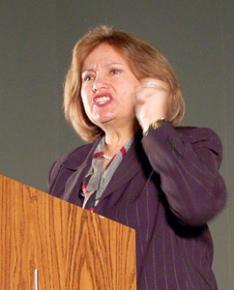Cincinnati students confront Islamophobia
recounts the campaign that activists built to protest an anti-Islam speaker.
OPPONENTS OF anti-Muslim racism at the University of Cincinnati (UC) capped a quickly organized protest campaign by confronting Islamophobe Nonie Darwish when she came to campus November 13 to spread her hate.
Darwish, author of Now They Call Me Infidel, was invited by several groups, including the Chabad Jewish Student Center and Zionists of America, to deliver a speech titled "Finding the Peace Within."
But Darwish's talk was anything but peaceful. Although she tries to pass for a scholar, Darwish is known for relying on her limited personal experience--she is an Egyptian-born Muslim who moved to the United States and converted to Christianity--and out-of-context quotes and stories to make wild accusations about Islam and Middle Eastern countries.
At UC, Darwish's arguments raised ranged from the paranoid (Muslims are trying to bring the U.S. under sharia law) to the anti-historical (U.S. imperialism played no role in establishing dictatorships in the Middle East).
The audience wasn't willing to stand for it, and interruptions were frequent. Darwish's was so offensive that the president of Chabad, Jonathan Dress, was obliged to deliver a written apology that was printed in the UC newspaper: "As a believer of the Jewish faith and a student of the University of Cincinnati, I offer my apologies to the Muslim community and anyone else who was hurt by the words delivered in the presentation."

Students mobilized to protest Darwish's speech in advance. As soon as the Muslim American Society (MAS) and Campus Antiwar Network (CAN) members learned of the appearance, Chabad was asked to replace Darwish.
When these calls were dismissed (by both Chabad and UC Student Affairs), several groups, including the MAS, CAN, the Muslim Student Association (MSA) and the International Socialist Organization (ISO), formed a coalition called Students United Against Hate.
Outside the building where Darwish spoke, protesters rallied--some wore t-shirts silk-screened by CAN with the message "Being Muslim is Not a Crime." Inside, many people held up paddles saying "That's racist!" after Darwish's offensive remarks.
The box for audience members to submit questions was filled with copies of the same ones to hamper the moderators from censoring critical questions. As a result, the question-and-answer session had to be opened up to the audience. As a result, Darwish was hammered by requests to cite her sources and told off by a white woman married to a Muslim man.
The silver lining to this event was the discussion that took place afterward. Around one-third of the audience (30 to 40 people) moved to another building to continue a discussion chaired by CAN and the ISO, where students could express their feelings about the talk. "I think she underestimated us," one person said. "We're students. We think every day."
The presidents of both Chabad and the MSA were there, and they agreed with the general sentiment for intercultural understanding. Despite her best efforts, Darwish did more to unite the student body than divide it.
The importance of this speaking tour at a time when the United States is involved in wars in two Middle Eastern countries (and carrying out bombing missions in others) shouldn't be underestimated. The fear and hate that Darwish spreads against Arabs and Muslims is intended to justify these imperialist adventures.
Darwish's own agenda is clear. In an interview at University of California-Berkeley in October 2007, she made the absurd claim, "Muslim student organizations is [sic] on every college campus, financed by Saudi Arabia, spreading radical Islams [sic] right here on college campuses."
People like Nonie Darwish should be opposed wherever and whenever they appear.


